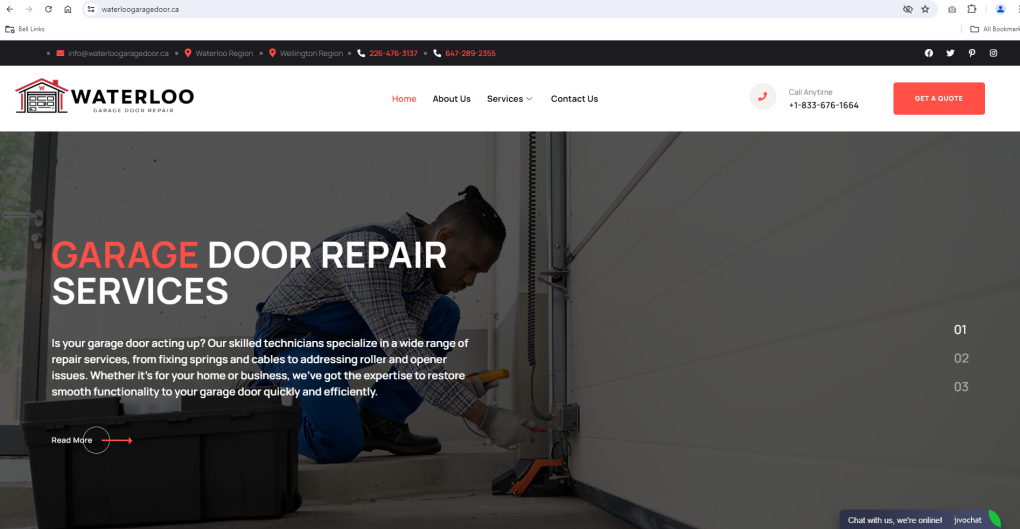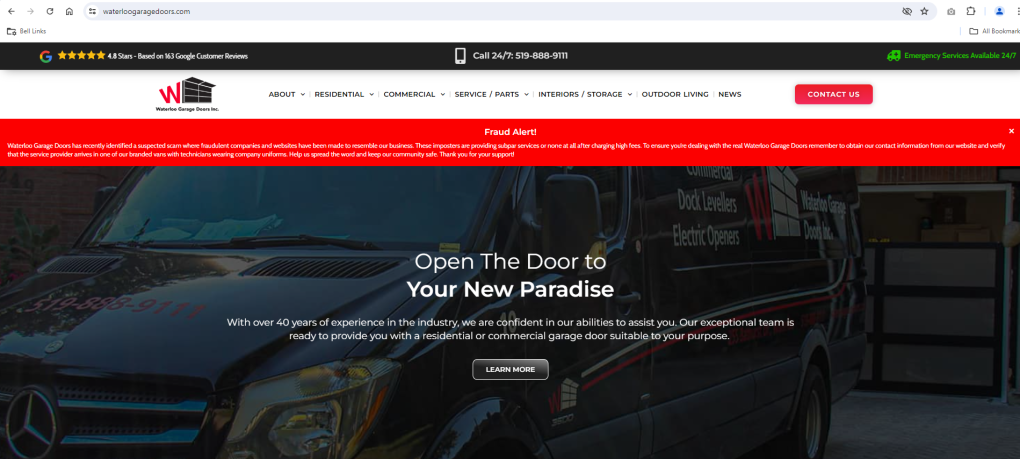Waterloo, Ont. garage door company calls imitation websites 'absolutely disgusting' for scamming clients
A garage door business in Waterloo, Ont. says scammers tricked their customers into paying ridiculous fees for subpar services using imitation websites.
Over the last several weeks, Waterloo Garage Doors has received multiple calls from frustrated customers who said they discovered large credit card charges for repairs or maintenance.
Clients were shocked to learn they weren’t dealing with the real Waterloo Garage Doors in the first place.
“We started having some customers calling us, quite upset, about exorbitant bills they had received, and after doing some investigation, realized they hadn’t been dealing with us,” explained Angela Young, co-founder of Waterloo Garage Doors.
While imitation is the sincerest form of flattery, in this case, imitation has caused nothing but headaches.
Websites that look like Waterloo Garage Doors have been popping up online, looking to lure unsuspecting customers into doing business with the wrong company.
 Fake website for Waterloo Garage Doors.
Fake website for Waterloo Garage Doors.
“[Customers are] promised a very low introductory price, but they are required to give a credit card in advance,” Young explained. “Then the charges are just racked up and billed to them, taken off their card.”
The scam sites mimic the real company, offer similar services and even look like a legitimate business at first glance. A key difference is that the web address ends with “door.com” instead of a “doors.ca.”
 Real website of Waterloo Garage Doors.
Real website of Waterloo Garage Doors.
The work of scammers has been enough, though, to dupe both past and present clients.
“They were getting charged $800 to $1,000 for something we would normally charge $200 or $300 for,” Young said. “It was just absolutely disgusting for people to get bills like that.”
How to spot garage door scams
Garage door scams are something the Better Business Bureau has been keeping a close eye on.
Here are some the warning signs to look out for:
- Business name: Garage door scammers often use multiple names that are generic and unclear and not listed as a legally registered business.
- No physical address: Garage door scammers do not have a legitimate physical showroom or will use a fake address. Scammers may only provide a phone number or an email address to avoid giving you a verifiable location.
- Lack of identification: Legitimate repair professionals typically wear uniforms, have identification and drive company-branded vehicles. Be skeptical if the individual does not have proper identification or a marked vehicle.
- Unrealistic low prices: Many scams advertise a low fee for the service call, only to demand more money for additional “repairs.” If a quote seems too good to be true, it probably is.
- High-pressure sales tactics: Scammers may use high-pressure tactics to convince you that your garage door requires immediate and costly repairs. They might insist that you shouldn’t wait and may even demand payment upfront.
- Immediate payment: Be cautious of any repair service that demands payment in full before any work is completed. Reputable companies will provide a detailed estimate and allow you to pay after the work is finished.
The Better Business Bureau also offered tips for avoiding garage door repair scams in the first place:
- Research the company: Listen to the company’s name, ask for their address when they answer the phone and compare it to their advertisement. Look up the company’s name and address online and add the words “complaint,” “review” and “scam” to see what others are saying. Check for reviews and ratings on reputable websites like BBB.org and read feedback from other customers to gauge their satisfaction with the services provided.
- Get multiple estimates: Always get multiple quotes for repair work. This will help you understand the average cost of the repair and identify any outliers.
- Ask for credentials: Request proof of insurance, licensing, qualifications and identification from anyone visiting your home for repairs. A qualified technician should be able to explain the problem and solution clearly.
- Get everything in writing: Before any work begins, make sure you have a written estimate that details the scope of work, material, and costs. This can help protect you from unexpected charges.
- Take your time: Don’t feel pressured to make a quick decision. Scammers thrive on urgency, so take your time to research, evaluate your options and understand pricing.
- Trust your instincts: If something doesn’t feel right or you’re uncomfortable with the technician or company, trust your instincts and consider seeking another option.
Regional police respond
The Waterloo Regional Police Service is echoing much of the advice shared by the Better Business Bureau.
“Go to the actual URL and it could be a difference of one or two letters, or a couple of numbers in the actual URL that’s actually taking you to a fraudulent website,” said Const. Brad Hickey. “Our biggest advice we can provide is don’t feel rushed to make a decision. We strongly encourage you to just stop, pause and think. Disconnect. Research the company more.”
Hickey said, while a lot of victims do report these incidents to police, there are likely many more that aren’t.
“Some people may not even realize they have been scammed for several weeks, months or even years later,” he added.
As for Waterloo Garage Doors, they want customers to do their research too and ask questions to ensure they are dealing with a real business.
The company has worked hard to build their reputation and they certainly don’t want to lose it to scammers.
CTVNews.ca Top Stories

Alberta RCMP officer charged with 2 counts of sexual assault
Const. Bridget Morla, a Leduc RCMP officer, has been charged with two counts of sexual assault in connection with an incident that happened two years ago.
Ontario dad removes hockey rink at heart of neighbour dispute
A Markham dad who drew the ire of neighbours and the city after installing a hockey rink in his backyard says the rink has now been taken down.
Trump demands immediate release of Oct. 7 hostages, says otherwise there will be 'HELL TO PAY'
President-elect Donald Trump is demanding the immediate release of the Israeli hostages still being held in Gaza, saying that if they are not freed before he is sworn into office there will be “HELL TO PAY."
Kingston, Ont. doctor in 'disbelief' after being ordered to repay $600K for pandemic vaccination payments
An Ontario health tribunal has ordered a Kingston, Ont. doctor to repay over $600,000 to the Ontario government for improperly billing thousands of COVID-19 vaccinations at the height of the pandemic.
Alleged gang member driving from U.S. arrested at Canadian border after making wrong turn
An alleged gang member coming from the United States was arrested at the Canadian border after reportedly making a wrong turn onto the Peace Bridge border crossing.
Harvey Weinstein hospitalized after 'alarming blood test,' attorney says
Harvey Weinstein was hospitalized Monday following an 'alarming blood test,' his attorney said, less than a week after he filed a legal claim alleging substandard medical care at New York City's notorious jail complex.
AC/DC announces North American stadium tour, Vancouver lone Canadian stop
Big news for AC/DC fans as the heavy metal bigwigs announced Monday they will hit the road next spring. But as of now, there’s only one Canadian show on the docket.
Nova Scotia lawyer suspended following ugly courtroom fracas
A Nova Scotia lawyer who had to be restrained by deputy sheriffs during a court appearance earlier this year has lost his appeal of a suspension following the bizarre incident.
Negotiations between Canada Post, union still on hold
Canada Post says it's waiting for a response from the union representing some 55,000 striking workers after it offered a new framework for negotiations over the weekend.

































